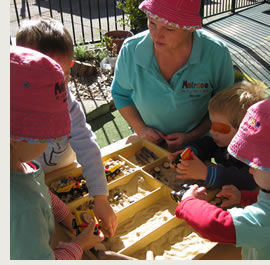|
|
|||||
|
|||||
| Child care person in the spotlight | |||||
| Elisabeth Curcic–Daher - Melrose Family Day Care NSW | |||||
 Child care professionals share a commitment to improving society by creating dynamic and nurturing care environments for Australia's youngest learners. This month we feature an interview with Elisabeth Curcic–Daher Child care professionals share a commitment to improving society by creating dynamic and nurturing care environments for Australia's youngest learners. This month we feature an interview with Elisabeth Curcic–DaherWhat is your name? My name is Elisabeth Curcic–Daher and I am 55 years old. Which early childhood education and care service do you work in? I work at Melrose Family Day Care (NSW) registered with CCA Scheme and currently have five children per day which will drop to four children per day next year. What is your professional background and career experience? I have a science (Chemical) background and was employed for 29 years in Design Engineering Group Sonar and Underwater as a Chemist. Melrose Family Day Care has been open for four years. I am a registered educator with CCA Scheme. I hold a Child Care Diploma and Diploma in Psychology. I was also recently awarded the 2013 Excellence in FDC Regional Educator Award Winner – North West and Hills District. What attracted you to a career in child care? Working with children the flexible hours and ability to work from home. What does a 'normal' day look like for you? My daily schedule is very flexible to allow for unplanned events or other opportunities that may arise throughout the day. Some days we do not fit all this in....but we try! We do go outside every day to play in the backyard and visit the park every week (weather permitting). We start at 7:30am to 10am with arrivals, breakfast/free play and circle time. Babies rest time is from 9am to 10am. 10 to 10:30 is morning tea at the centre or park. 10:30 to 11:45 is arts and craft indoor or outdoor. From 11:45 to 12 we clean up the playroom and wash up for lunch. 12 to 12:30 is lunch then we have story time from 12:30 to 1. From 1 until 3 is quiet time when some of the children sleep and others do a quiet activity. From 3 until 3:30 we have an afternoon snack and then 3:30-5 is structured play including group activities, puppet theatre, indoor/outdoor play etc. From 5 to 6 is free play until the parents arrive to pick the children up. What makes your service unique? Family Day Care environment is very unique. The same person cares for your child on a daily basis. The opportunity to bond with their child which provides comfort to parents. I think family day care centres have fewer germs. For parents, this means that your children will not get sick as often. We also have a small number of children which means individual needs can be catered for. Melrose Family Day Care has an Explore and Develop Philosophy: I cherish the innocence of children by providing a safe and protective environment.What are some of the advantages of working in the early childhood education and care sector? This is a career where no two days are the same. Where every day you feel that in some small way you have made a difference to a child's life. This is a job where the work is demanding but the rewards are high. You'll be able to watch children grow and gain confidence, to be a part of their success and to be there for them when they need you. You will earn their trust by making them feel secure and happy. And you'll find that you are not only working with the children, but their parents as well. They will look up to you and may ask for support and guidance with their child's development. That special smile, laugh and a good bye. What are some of the biggest challenges facing the early childhood education and care sector?
How has your service changed to deal with these challenges? Reducing expenses by going electronic to implement the EYLF and new regulations. Photos are included to illustrate the links between the principles, practice and learning outcomes. Undertaking reflective practice. Experimenting with new ideas and ways of teaching and caring, and to keep motivated about making a positive difference to children's learning. Providing children with choice, encouraging children's choice and voice more widely in the curriculum decision-making process. How does the industry need to change to adapt to these challenges? Family Day Care ratios should be increased according to area used for Family Day Care. If the educator has an area like a long day care centre they should be able to increase the number of children and employee a qualified assistant. Family Day Care now is required to be run like a long day care centres and follow the same regulations the subject of ratios and staff is very important for family day care to be a viable business. What advice would you offer someone thinking about a career in early childhood education and care? Be flexible as each day brings new adventures and challenges. Reflective practice can help educators think more deeply about their work and motivate them to explore new ideas and approaches Educators need to challenge their thinking and practice. An educator can:
Play provides children with opportunities to express a sense of agency and demonstrate their competence and be leaders in their own learning. Play can provide children with a sense of belonging and being and supports the development of children's individual and social identity. |
|||||
| Do you work with someone who deserves to be profiled in an upcoming edition of our newsletter? If so let us know by emailing editor@careforkids.com.au. All of the child care professionals we interview will receive a selection of DVD's for their service courtesy of Roadshow Entertainment. | |||||
|
|||||||||
